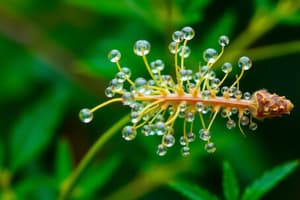Podcast
Questions and Answers
Which branch of science primarily studies the structure and function of living organisms?
Which branch of science primarily studies the structure and function of living organisms?
- Biology (correct)
- Chemistry
- Physics
- Geology
What is the central concept in chemistry that relates to how substances interact and change?
What is the central concept in chemistry that relates to how substances interact and change?
- Ecological systems
- Chemical reactions (correct)
- Evolutionary relationships
- Cellular respiration
Which concept is NOT a primary focus of physics?
Which concept is NOT a primary focus of physics?
- Mechanics
- Thermodynamics
- Genetics (correct)
- Optics
In biology, what hierarchical order correctly represents the organization of life's complexity?
In biology, what hierarchical order correctly represents the organization of life's complexity?
Which of the following is NOT considered a subfield of chemistry?
Which of the following is NOT considered a subfield of chemistry?
What role does experimentation serve in the scientific method?
What role does experimentation serve in the scientific method?
Which of the following is a primary focus of physical chemistry?
Which of the following is a primary focus of physical chemistry?
Which principle describes the study of the evolutionary relationships between organisms?
Which principle describes the study of the evolutionary relationships between organisms?
What is a fundamental principle of mechanics as studied in physics?
What is a fundamental principle of mechanics as studied in physics?
In the context of chemistry, what does stoichiometry refer to?
In the context of chemistry, what does stoichiometry refer to?
Flashcards
Science Definition
Science Definition
Science is a systematic approach to understanding the universe through testable explanations and predictions.
Biology Subject
Biology Subject
Biology studies living organisms, their structure, function, evolution, and interactions with each other and their environment.
Chemistry Focus
Chemistry Focus
Chemistry studies the composition, structure, properties and reactions of matter at the atomic and molecular levels.
Physics Scope
Physics Scope
Signup and view all the flashcards
Scientific Method
Scientific Method
Signup and view all the flashcards
Biological Hierarchy
Biological Hierarchy
Signup and view all the flashcards
Evolution's Role
Evolution's Role
Signup and view all the flashcards
Atomic Structure in Chemistry
Atomic Structure in Chemistry
Signup and view all the flashcards
Classical Mechanics
Classical Mechanics
Signup and view all the flashcards
Organic Chemistry
Organic Chemistry
Signup and view all the flashcards
Study Notes
Science
- Science is a systematic enterprise that builds and organizes knowledge in the form of testable explanations and predictions about the universe.
- It's a process of inquiry, observation, experimentation, and analysis.
- Main branches include physics, chemistry, biology, and others.
- Scientific knowledge is constantly evolving as new discoveries and technologies emerge.
- Scientific methods typically involve a cyclical process of hypothesis formulation, experimentation, data analysis, conclusion drawing, and potential revision of the hypothesis.
- The scientific method fosters a systematic and rigorous approach to understanding the natural world.
Biology
- Biology is the natural science that studies life and living organisms, including their structure, function, growth, evolution, distribution, identification, and classification.
- It encompasses a broad range of subjects, from molecular biology to ecology.
- Key concepts include cellular biology, genetics, evolution, ecology, and the diversity of life.
- Biological systems are hierarchical, with atoms forming molecules, molecules forming cells, cells forming tissues, tissues forming organs, organs forming organ systems, and organ systems forming organisms.
- The study of evolutionary relationships between organisms is central to understanding the diversity of life.
- Organisms interact with each other and their environment through complex ecological systems.
Chemistry
- Chemistry is the science that deals with the composition, structure, properties, and reactions of matter, especially of atomic and molecular systems.
- It's concerned with the elements, compounds, and their interactions.
- Important concepts include atomic structure, bonding, chemical reactions, stoichiometry, thermodynamics, kinetics, and equilibrium.
- Chemistry plays a vital role in various fields, including medicine, materials science, and environmental science.
- Organic chemistry focuses on carbon-containing compounds, whilst inorganic chemistry studies the remaining elements and their compounds.
- Physical chemistry combines chemical principles with physical concepts, like thermodynamics and kinetics.
Physics
- Physics is the fundamental science that studies matter, energy, and their interactions.
- It attempts to explain the physical laws of the universe.
- Key concepts include mechanics, thermodynamics, electromagnetism, optics, and modern physics.
- Classical mechanics describes motion in relation to forces and energy.
- Thermodynamics investigates the relationships between heat, work, temperature, and energy.
- Electromagnetism studies electric and magnetic phenomena.
- Optics explores light and its properties.
- Modern physics includes quantum mechanics, relativity, and nuclear physics.
- Physics is crucial for understanding the universe from the smallest particles to the largest structures.
Studying That Suits You
Use AI to generate personalized quizzes and flashcards to suit your learning preferences.




